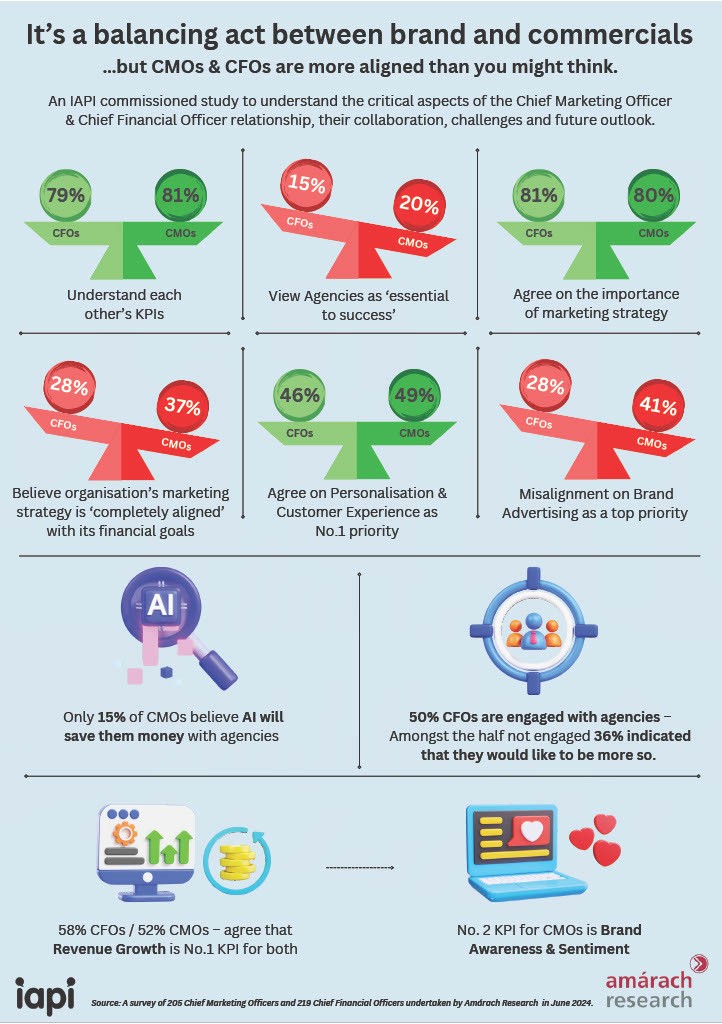
New research carried out by Amárach Research for IAPI points to a greater alignment between chief marketing officers (CMOs) and chief financial officers than is currently perceived by the industry.
The research was carried out in May and June this year with 205 CMOs and 219 CFOs taking part.
According to IAPI, the topic of CMO-CFO relations is a recurring theme in business commentaries and it commissioned research to understand the critical aspects of the CMO-CFO dynamic. “The purpose of the research is to provide valuable insights into how these key executive roles can work together more effectively to drive organisational success. “
Some of the themes covered in the Amárach research include alignment in terms of growth priorities, measurement (KPIs), investment in terms of marketing expenditure, value added by external partners and future investment priorities.
“While there is a perception among marketing and agency practitioners that finance presents a barrier or could even be hostile to the practice of marketing, the findings dispel this particular myth,” the research notes.
“It shows that a cordial relationship, in general, exists between the two functional heads and they have a good working relationship with one another. It shows that financial leaders are open to persuasion and marketers and their agency partners can be reassured that the practice of marketing is valued and respected by the finance departments in Ireland today,” it adds.
According to some of the findings, 80% acknowledge the relationship as either ‘very’ or ‘quite important’ while nearly a third rate it as ‘very important’.
“In addition, about 80% of both CMOs and CFOs believe they have a very good or good understanding of each other’s KPIs which suggests a strong level of cross- functional knowledge. In addition, two-thirds of respondents in both financial and marketing roles possess a solid understanding of each others priorities and objectives,” the research notes.
The real misalignment is in relation to what CMOs and CFOs pay attention to. Unsurprisingly, the latter is focused exclusively on financial variables (turnover, profit, cashflow, investment); while the former has a mix of financial and non-financial KPIs (brand awareness, customer engagement etc). All of this is perfectly normal except that a majority of both CMOs and CFOs agree that differences in understanding KPIs currently impacts the decision-making processes in their organisations.
The Amárach research did find that only 28% of CFOs believe that their organisation’s marketing strategy is ‘completely aligned’ with its financial goals. For CMOs, meanwhile, just 37% of CMOs believed this. “Our research for IAPI shows that the vast majority of CMOs and CFOs are ‘growth partners’, working together to grow the topline and the bottom line in businesses throughout Ireland”, says Gerard O’Neill, Chairperson, Amárach Research.
“But like all partnerships there are sources of tension, especially when it comes to choices and trade-offs. The good news is that they are keen to better understand how they can drive future success together, with the same number of CFOs and CMOs – 8 in 10 – agreeing that marketing is important to achieving their business Goals,” he adds.
When it came to the perception of agencies, the research found that om average only about 20% of CMOs see external agencies as essential for success, and this falls to 15% on average for CFOs. Interestingly, consulting firms are considered even less so with only 9% of CMOs rating them as essential and 14% of CFOs.
Amárach says that this does present an opportunity for agencies to close this gap and establish a stronger position for themselves within the client organisation. “Agencies that help CMOs show a clear connection between marketing expenditure and measurable outcomes that matter to CFO and the wider business, will naturally become more essential to the business,” it says.
Speaking about the Amárach findings, Abi Moran, CEO of Folk VML and President of IAPI says it is positive to see the “the level of understanding and respect for each other’s functions, which is a testament to the work the marketing and advertising industry has done to incorporate metrics and commercial accountability into everything we do.”
However she also believes more needs to be done to support our clients in building the commercial case for effective brand advertising.

To download a full copy of the research click HERE




















